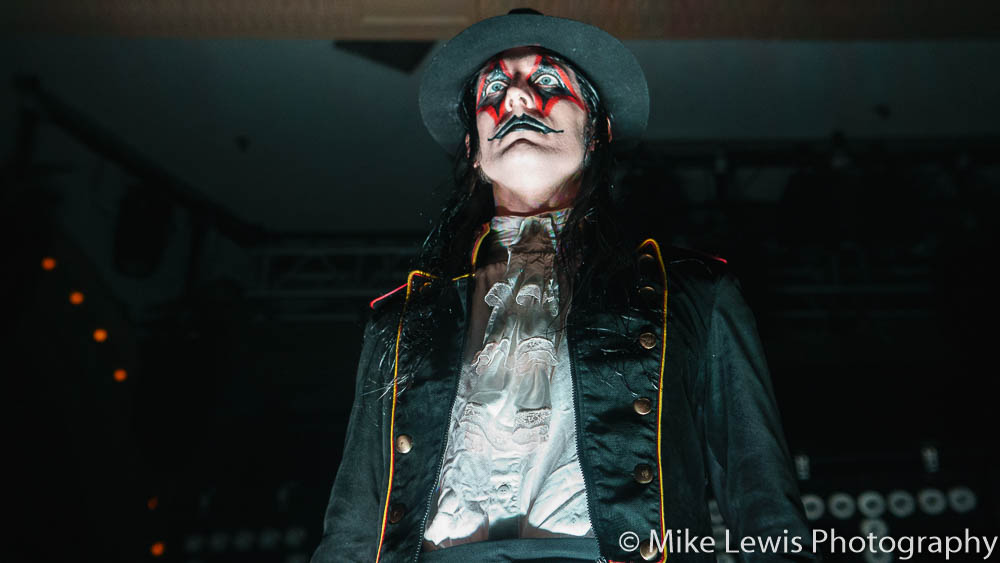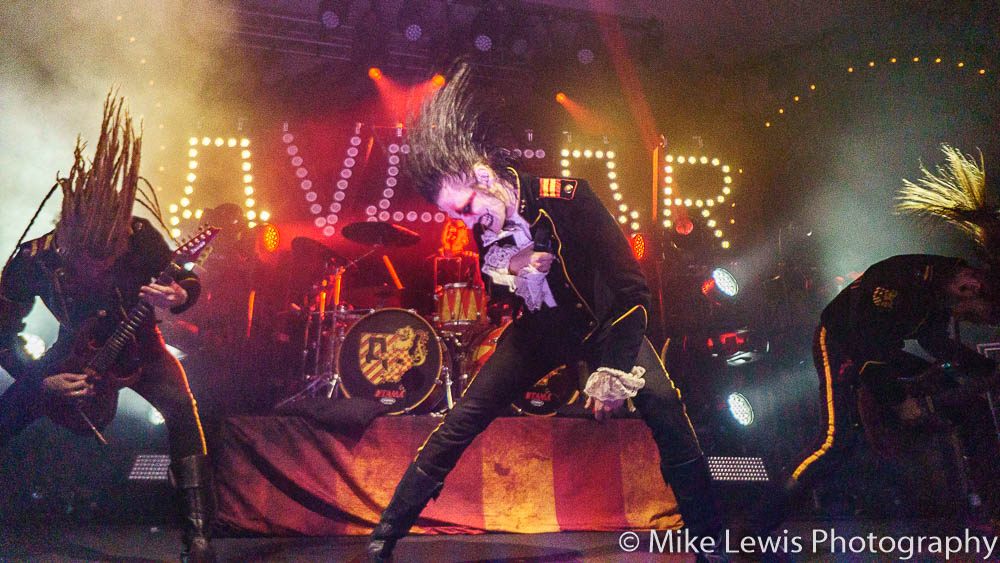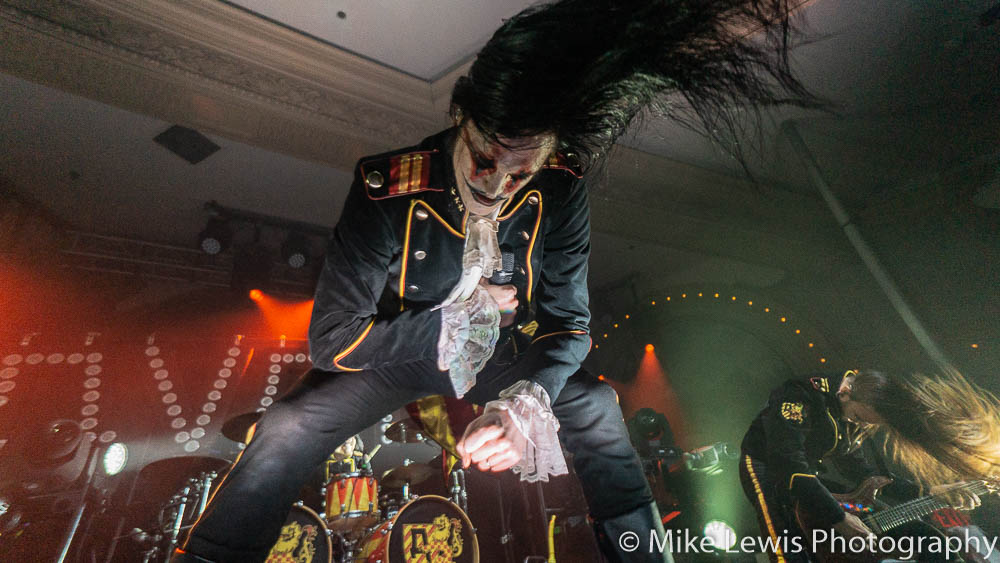Photos By Mike Lewis Photography
Standing at the foot of the 669 steps ascending before me, at the height of which the King gracefully sat on his throne with the royal axe perched lazily atop his knee, it occurred to me to kneel before the Monarch of Metal in gratitude for the broken fast of mediocrity that had plagued our once Metal-rich lands and for the feast of bountiful, richly crafted masterful music being spread throughout the land by the AVATAR of his royal self. Dutifully humbled I ascended the stairs to meet the imposingly lean, dark and maniacally grinning painted face of the Voice of the King, the mad Jester Johannes Eckerström. Exaggeratedly gesturing toward a seat near (but not too near) the King he spun about in a dramatic circle and slid down the length of his cane to rest gracefully at the right hand of the King’s magnificent Metal throne.
As I shakily produced my quill and parchment his Metal Majesty stroked his beard thoughtfully then leaned to whisper something into the Jester’s ear which brought that unhinged clownish grin back to his beaming madman’s face. Leering gleefully he exclaimed, “As royal scribe you are here to document the legacy of Avatar Country and of the good King for the posterity of our society and the good of all mankind. Ask your questions, and if the King deems them worthy to be given answers then I shall speak them.” And thus our parlay begat the parchment you now read, wherein shall you find discourse on the forthcoming Legend Of Avatar Country featurette, the need for change & challenge in the creative process, and the ingredients for building a lasting musical legacy. Read on and know that the realm of Metal is in most capable hands, hands capable of some super sweet guitar solos but most importantly of bearing his unrivaled standard to the mountain tops and bellowing from the peaks: “The King Welcomes You To Avatar Country!”
KNAC.COM: The first thing I wanted to ask of course is the Legend of Avatar Country movie. You opened a Kickstarter [campaign] and I understand your goal has been met pretty fast.
ECKERSTROM: Yeah! As we speak this is day one of it being up and running and it exceeded…it is already funded and we have reached goal one already; I haven’t checked it in the last half hour but it’s been crazy! It’s almost like it’s overwhelming, you know? (laughs)
 KNAC.COM: Humbling, I bet.
KNAC.COM: Humbling, I bet.
ECKERSTROM: Yeah, things became very real very fast. We’re grateful for it and we are looking forward to the opportunity to do this thing we’ve been working towards for a long time.
KNAC.COM: Did you feel…you have a really loyal fan base but did the level of support…or maybe the immediacy of it surprise you more than you were anticipating?
ECKERSTROM: Again I guess that’s the thing where it becomes the sensation of things becoming very real very quickly. Even when you put these rewards out there and say, “pledge so much and I’ll give you this thing or that thing” – It’s hard for us to…I mean especially for me it’s hard to quantify something in terms of money, to put numbers on things. If I tell you that this bottle of water should be $.25…well water should be fucking free, bad example; your energy drink or whatever that is – if you say that should cost one cent I would say, “Yeah, that makes sense” but if you were to say that should cost $100 I would say, “That makes sense too.” (laughs) I’m not good at quantifying, especially when it’s something artistic based on someone voluntarily supporting that. So just to quantify that is really hard for me. It makes sense on a certain level of the rewards that is a merch package of unique rewards that they can only get through this Kickstarter campaign and then we put out these bigger rewards and very unique items and they are going too. I really don’t know what to say about it, but I am very grateful.
KNAC.COM: What exactly would the full project entail? Are you going to finish making videos for each song?
ECKERSTROM: Yeah that’s the short version is that the three videos that have been released so far are part of a greater story that we planned out from the beginning and we want to finish the work on that and it will basically be what’s called a “featurette”, which is longer than a short film but shorter than a full feature length film, it’s somewhere in the middle. But yeah the main…the meat of it are these music videos but then glue them together even further than they would by putting them after each other.
KNAC.COM: You’ve been treating each album as its own given project and whatever that entails, like with Feathers & Flesh where you had the cool book, and so each thing has its own companion way of delivery. I mean it’s amazing in your videos anyways, I love an artist or group like you guys or TOOL that can take control of the visual aspects and other things so it’s a full performance. It’s truly awesome.
ECKERSTROM: Thank you, that’s very important to us as well, any output of the band has to be something we can completely sign off on and for us music videos is another way to be creative and another way to express ourselves, and that aspect to us is just as important as the songs are.
KNAC.COM: So in that sense do you foresee the release of the movie and whatever touring that’s involved - is that going to be the “death of the king”, so to speak? Or is it something you will maybe carry on or revisit in the future?
ECKERSTROM: Well in the distant future you never know what we’ll do in detail but AVATAR is all about not writing the same song twice and moving on to a new challenge. Basically what we’re trying to do artistically is always look for a way to keep making music hard, challenging. We never… What is the English expression…“Rest on our laurels” – is that how you say it? We never want to do that so therefore it’s definitely about “keep moving on” because we have managed to make this statement and expressed whatever we wanted to express with each album or song, it’s time to find something new to say, you know? You don’t wanna…if Leonardo DaVinci had just painted 200 Mona Lisas maybe we wouldn’t have talked about him so much now. (Laughs) Obviously, not to compare us to a Renaissance genius of course, but just saying that you wanna keep pushing forward; once we get really good at something like halfway through the first tour you’re basically like, “Ok, now we’re starting to nail this”
 KNAC.COM: Time to move on to something else.
KNAC.COM: Time to move on to something else.
ECKERSTROM: Right. The appeal goes away and you want to push into something else with it.
KNAC.COM: So you’ll never be that band 20 years down the road that – granted you’re still around, but you’re only playing the songs from 20 years ago.
ECKERSTROM: Well we will be that band still playing songs from 20 years ago but we will still want people to be excited for that new album. Remember when Bruce Dickinson came back [to IRON MAIDEN] on Brave New World and that was basically 20 years into their careers; and that fit very well into playing “Running Free” or “Murders In The Rue Morgue”, then playing “Brave New World” or “Out Of The Silent Planet” – I would like to see it like that because Metal as a genre and Metal as a culture and going to concerts and the live experience is about many things, and being a band is also about legacy, of course. So granted, if we are around in 20 years that should probably mean that we’ve built some kind of legacy and you should always respect that, you know? Metal I guess is the only…for being known as such a supposedly rebellious subculture, there are lots of radical thinkers and free thinkers in every direction, we’re not a very homogenous group of people; but for being that I think we are also – in the terms of Western musical subcultures (laughs) – the one that respects our elders the most. BLACK SABBATH still keeps getting new fans.
KNAC.COM: I interviewed Ian Hill from JUDAS PRIEST earlier this year and it was a similar conversation where – I don’t know if you’ve heard their new album…
ECKERSTROM: (Excitedly) Oh it’s so good!
KNAC.COM: It’s fantastic, man!
ECKERSTROM: What was the one called before that, the one with the demon on it? [Redeemer Of Souls]
KNAC.COM: I honestly don’t remember, that was gonna be my point (laughs)
ECKERSTROM: Yeah I was like, “…meh. Ok, they’re old that’s why” [makes so-so hand gesture] but then Firepower came out and I was like, “Holy…Moly!” (laughs)
KNAC.COM: (Laughs) Exactly! And he had mentioned how this is the first generation of really any type of music where you have a 50 year legacy from a band, you had the birth of the Blues and other older influences that became Metal but those artists never really experienced that.
ECKERSTROM: Because Robert Johnson died when he was 27 anyway and it just this local, rural thing; he didn’t get to sell out Madison Square Garden. So yeah, and a music career was considered a short thing in popular music…
KNAC.COM: Enjoy it while it lasts.
ECKERSTROM: Yeah, exactly. Did THE BEATLES break that mold? But still they only released albums for eight years; I have released albums for 12. (laughs) Think about it. So yeah, definitely we live in a new time where these things keep coexisting alongside each other, and since Metal music was never…well, almost never, worried about trends or whatever. I’m not a big Hair Metal person or whatever we choose to call that period, but the rest of the time it doesn’t seem that we have worried too much about what is trendy or not and therefore it’s going to be white hot popular for a while and then it will go on a slow burn period but it will never truly disappear; and even in the slow burn period the masses and their perception of it will still be that it’s great. The big narrative – especially in the United States – is that Grunge killed Metal, and in terms that Hair Metal went away and those bands started to make good albums, fair enough – but both here but even more Europe the ‘90s was arguably the best decade for Metal, Death Metal really came into its own…
 KNAC.COM: Gothenburg.
KNAC.COM: Gothenburg.
ECKERSTROM: Exactly – Gothenburg, Stockholm, Florida – it really kept going throughout the ‘80s and that’s where everything from OPETH to MESHUGGAH to BLIND GUARDIAN – all of that came into its own so Metal did absolutely fine anyway. That’s the nature of the genre, really.
KNAC.COM: And back to the whole idea of now being able to stick around that long and to have a conscious impact on your own legacy it paves the way for bands like AVATAR who are not content with the factory assembly line process so it seems to make you even more cognizant and wary of each step you take forward, not necessarily for the sake of whatever appeal, but just to control your legacy as you move forward.
ECKERSTROM: Yeah, caution in terms of keeping control, but that’s the only type of caution I would attribute to the group because we started young and we got to release a couple albums and stuff happened for us – nothing really big, I didn’t pay rent with music money and we got to tour one month here or three weeks in the fall – but it never really took off. And we reached a point when recording and releasing Black Waltz where we said, “Screw this, this is going to be our last album. Now we do it as what’s for real on our terms, whatever is left in the bank account we will pour into this and whatever happens, happens.” And we were content to know that we ended on our terms musically; and that worked out really well for us. Since then a big lesson I took with me from that is that this can be over at any moment, you know? You never truly, truly know what other people are going to think and you can’t waste your time second guessing that, the demographic of the band; the control groups of the band that we study are just the five members of the band, that’s it. There’s no real caution there, every album is our last album ever.
KNAC.COM: That’s a great way to approach it.
ECKERSTROM: Yeah and if at some point you get the itch to write another one…
KNAC.COM: Like Ozzy with touring. (laughs)
ECKERSTROM: (Laughing) Only we won’t call every tour our farewell tour, but the point is if something tanks and no one likes it and everybody hates us because of what we released then so be it, you know? I can go home, fine; I can do something else. But if that is how it ends at least I want to make sure that I liked what I recorded and we liked what we did. Because like everyone else…the thing is, like I’m a huge MEGADETH fan; I did not like The World Needs A Hero when that came out in 2000-2001. The nice thing about that is I could turn that album off and put on So Far, So Good…So What? instead and also was very happy with albums of the later years, what is now the more contemporary MEGADETH and I don’t have to live with The World Needs A Hero; it barely exists to me now. Dave Mustaine and the other guys have to live with it – they are the only ones that have to live with it, so I hope they are pleased with it and can stand behind it. And the same thing is for us, if we release something that is crap to everyone then they can turn the music off and go for a walk but the music has to stay with us.
KNAC.COM: So kind of in style with the way you compartmentalize each album, each approach…you worked with [producer] Sylvia Massey recently, who has also worked with TOOL; do you approach that freshness at a production level? I know you mix it up with your recording styles, is switching producers something that’s also imperative?
ECKERSTROM: Absolutely. Changing producers is a great way to keep yourself on your toes. We don’t change producers every album and we won’t change producers every album, and even throughout our career we may return to someone that we’ve worked with in the past; it’s not as if we say goodbye forever to anyone, it’s just that…I’m sure everybody in the band would like to work with a new singer, but that’s not going to happen, just as anyone wanting to work with other members isn’t going to happen, but
 changing personnel is a good way to shake things up and no one is quitting the band; so producers are a good way to change approaches. That’s why we changed recording locations so much this time: As far away from home as possible in Thailand and then as close to home as possible, meaning it was within walking distance of my parents’ house. It’s just the things you have control over, you try to keep those things fresh; you start seeing and building patterns no matter what you do in life, and the more time passes that you’re involved with something the more you’re kind of able to put all that into a box and you have to stay out of that box as much as humanly possible because now after so many albums we know what it’s like to sit next to a mixing board with an acoustic guitar in our laps jamming ideas while a producer mixes files and gives a red little scribble here or a green little scribble there, it’s the same every album; but you can change where you are and who you are sitting with and that can help a lot getting into a mindset of writing new songs.
changing personnel is a good way to shake things up and no one is quitting the band; so producers are a good way to change approaches. That’s why we changed recording locations so much this time: As far away from home as possible in Thailand and then as close to home as possible, meaning it was within walking distance of my parents’ house. It’s just the things you have control over, you try to keep those things fresh; you start seeing and building patterns no matter what you do in life, and the more time passes that you’re involved with something the more you’re kind of able to put all that into a box and you have to stay out of that box as much as humanly possible because now after so many albums we know what it’s like to sit next to a mixing board with an acoustic guitar in our laps jamming ideas while a producer mixes files and gives a red little scribble here or a green little scribble there, it’s the same every album; but you can change where you are and who you are sitting with and that can help a lot getting into a mindset of writing new songs.
KNAC.COM: And as far as that writing process do you guys have a tendency to do a lot of writing on the road or…
ECKERSTROM: Eh…there’s a mix, there’s always a big ambition and a little result when writing on the road but we’ll play around here and there; I have an external sound drive with me and my microphones and stuff like that so that if the muse comes knocking saying to do something I can scribble and sketch. A good part about the road is that it’s a part of our lives that is so heavily and consistently focused on the band that the most important conversations are being held then and of course discussions for lyrics and showing each other stuff all happens on the road. There’s no really straight forward method and we are multiple songwriters in the band, so depending on who had a better spring writing than the rest then it’s like, “Whoa, there’s gonna be a lot of your riffs on this album”. And we go from everyone trying to take their idea as far as they can individually first and sometimes we wind up with a song that’s basically 95% done and everybody agrees that it’s great but then other times someone has a riff or some parts then we start to meddle with it as a group, because there’s that transition from individual work with a varying result to a group effort where somebody else steals the song and finishes it for them or just the real group effort with that person getting the feedback then going home and trying it on their own. These are all interchangeable so there is no clear method and there are no rules.




